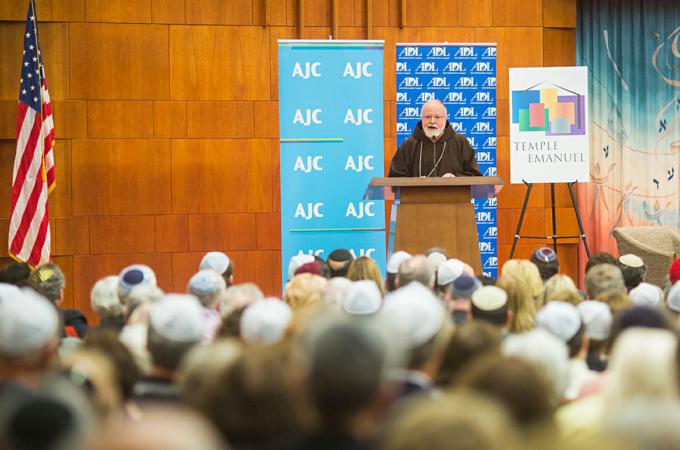Brotherhood of Catholics and Jews in Boston celebrated
NEWTON -- Before Cardinal Seán P. O'Malley could begin his address at Temple Emanuel in Newton on March 10, the crowd of hundreds rose to its feet and enthusiastically applauded. The cardinal, clearly moved, said he was overwhelmed by the warm welcome.
For the last 50 years, the growing mutual affection between Jews and Catholics has been fueled by Nostra Aetate, the Second Vatican Council's declaration on the relation of the Church with non-Christian religions. The declaration -- promulgated on Oct. 28, 1965 by Pope Paul VI -- notes that Jesus himself was Jewish and that his death cannot be charged against all Jewish people.
In remarks made before Cardinal O'Malley's address, Rabbi Wes Gardenswartz praised Nostra Aetate and the "courageous moral leadership of the Catholic Church." Rabbi Gardenswartz is a rabbi at Temple Emanuel, which, along with the Anti-Defamation League and AJC Global Jewish Advocacy, organized the event.
He said that for nearly 2,000 years distrust and dislike marked the relationship between Catholics and Jews. At times, Christians attacked Jewish communities, and innocent blood was spilled in the name of God.
Through Nostra Aetate, Christians were encouraged to love the Jewish people and refer to them as brothers in faith, he added.
Cardinal O'Malley said that both Catholics and Jews call Abraham father. Nostra Aetate urged Catholics to have a deeper awareness of the Jewish beginnings of the Church and acknowledged that the Jewish people passed on the Old Testament and many traditions like the weekly observance of the Sabbath.
The cardinal said that in the 1970s, while he was serving immigrants in Washington D.C., he was approached by ADL members about working together to oppose anti-Semitism among members of the Hispanic community. Cardinal O'Malley said he believed that such action was unnecessary, until the following Holy Week when one of his parishioners suggested burning a mannequin that would represent a Jewish person.
He went back to his office and called the ADL members for help. They began hosting Seder meals, a Passover tradition that Jesus himself participated in at the Last Supper. The meals and other events helped to build mutual understanding and respect between the faith communities, despite their significant differences.
"If in the past, we have been part of the problem, we, as Catholics, need to be part of the solution," the cardinal said, adding that Catholics must approach the Holocaust with repentance, acknowledging that many baptized Christians facilitated the Holocaust either by direct participation or through inaction.
Cardinal O'Malley spoke at length about the great accomplishments that could be attained by Jews and Catholics working together. Both groups want to end illiteracy, poverty, war and addiction. In partnership, both communities can reach out to those who are suffering -- the poor, the sick and the hungry.
He also praised the Jewish community's clear opposition to the hatred of Muslims. He called the rejection of Syrian refugees on the basis that they are Muslim "horrifying."
"We have much in common, and we will be judged by the same God. We are waiting for the return of the Messiah; you are waiting for the coming of the Messiah. Let us work together to repair the world, to build a civilization of love. Our God will be pleased," he concluded.
Robert Leikind, director of AJC Boston, spoke about the long-time partnership between the Catholic and Jewish communities in Boston. In 1991, a taskforce with members from the AJC and the Archdiocese of Boston worked together to set guidelines to how the Jewish faith would be presented by Catholic educators.
He said much has been accomplished through the cooperation of people from both faiths. He then thanked the archdiocese for condemning anti-Semitism, adding, "Your voice is critical and deeply appreciated."
Robert Trestan, director of ADL New England, said that although Nostra Aetate is not a perfect document, it set in motion an increased understanding between Jewish and Catholic people. Pope St. John Paul II was the first pope since Peter to visit a synagogue and both of the subsequent popes have done the same.
"The process is still unfolding," he said. "The challenges that yet remain can be addressed, and sometimes resolved, between friends."



















